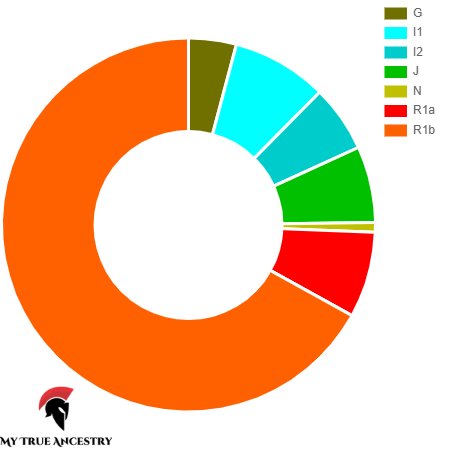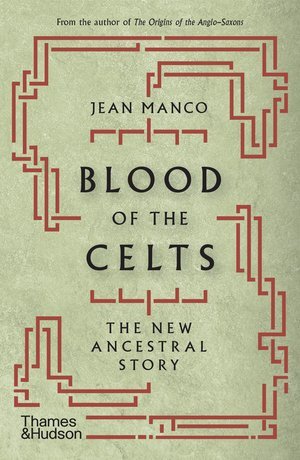Discovering My ancient Roots
As a descendant of immigrants, I have always wondered where I came from. That (and rude people asking, ‘what ARE you?’) spurred my interest in genealogy. From the time I was a teenager, I interviewed older relatives, searched census data, and compiled my family tree. And yes, I even submitted my DNA for ancestral analysis (and made all my family members do it, too).
While it was fascinating tracing each branch of my family tree to when they made the Atlantic crossing, the trail inevitably grows cold. You’re going to run into illiterate ancestors who left no records of their existence. I’m lucky enough to be able to trace my ancestry 11-12 generations, but everyone runs into a wall - anyone claiming possession of a complete tree of their ancestry from biblical Adam actually has a mostly-falsified record. There are simply going to be dead ends, no matter how far you probe. Our familial connection to our ancestors of antiquity has been severed.
That is, until I learned about something called archaeogenetics (thanks, Noa!). This is the study of DNA extracted from archaeological remains in order to better understand human genetics, evolution, habits, and migrations. And, as all DNA is inherited, well…suddenly your ancient ancestors can become visible again.
I uploaded my DNA data, containing all my genome markers, to a database repository containing the DNA sequences of hundreds of thousands of ancient remains. The system matched my DNA markers with those belonging to people who lived thousands of years ago. In ten minutes, I was enlightened.

I am EXTREMELY Celtic!
I have always known I was a mixture of European races, with the primary sources being Germanic Europe and the British isles, but I wasn’t expecting this nebulous historical group to dominate the ancient breakdown SO completely. Everyone represented here was quite formidable. With these results, I can look at the spotty classical sources and know that my ancestors were almost uniformly amongst the peoples Romans called ‘Barbarians.’ Don’t tell me that knowing you share DNA with the Goths won’t change how you view Alaric the Goth’s sacking of Rome. It’s (somewhat) more personal now.
I was even more surprised at the specificity of the tribes, with Dobunni being the most prominent. Looking at the individual DNA matches, I found I matched with both a pre-Roman Pocklington chariot burial and a native gladiator buried at Eboracum (York) around 250 CE, among several others. There’s a sliver of Belgae here, as well, so I can claim some shared ancestry with Decimus.
Generally speaking, my ancestors made problems for the Romans. The Goths, Visigoths, Vandals, and Ostrogoths are all here, as well as the Gauls, Franks, and Lombards. Of the Iron Age German tribes represented in my ancestry, the Marcomanni were particularly troublesome during Marcus Aurelius’s reign; and the Cherusci were the tribe of Arminius and Thusnelda, who engineered and headed the massacre of 3 entire legions in the Teutoburg forest. Wow!
Of course, that also means that my ancestry inevitably contains Romans. ‘Romans’ as in citizens of the Roman empire, which extended from northern Africa in the south, to Britain in the north, to Portugal in the west, to parts of west Asia in the east. While not of Italian extraction, people living within the empire could attain citizenship by serving in the auxiliaries (and several weren’t given the choice - they were pressed into service), by marrying a Roman citizen (like an ex-soldier settling in a colony), or, if they lived during/after the reign of Caracalla, just by dint of living within the bounds of the empire. Given the genetic similarities I have with the modern-day Welsh, I can quite confidently assert there are Roman Britons in my past.
There are other groups in here as well - a lot of Viking ancestry, which accords with the many Viking incursions made into the British Isles and mainland Europe during the dark ages. Of course, the Anglo-Saxons are there as well. The Gaels represent my Irish ancestry; my great-great-great grandmother was a Callahan whose parents immigrated from a tenement patch in Buttevant, County Cork. The O’Callahans are an ancient clan that can trace themselves to the 11th century, and my DNA genome reveals that my Irish ancestry extends back further to the Neolithic. One of the most exciting outliers is the Western Scythians, who were horseback warriors from the Eurasian Steppe. Horse Girls (gender neutral) have left hoofprints all over my DNA!
When it comes to the nebulously named ‘Celts,’ they comprise a much disputed, disparate spread of people across Europe and parts of Turkey that shared some cultural touchstones and, to a lesser extent, language and genetics. The two cultural movements, Hallstatt and La Tene, denote two different eras in the Bronze/Iron Ages represented by distinct art styles, pottery shapes, and lifestyles (and named for the sites in Europe where large hoards representing these eras were discovered). From the perspective of archaeogenetics, the ‘Celts’ are linked by a Y-DNA haplogroup known as ‘R1b.’ R1b dominates my DNA matches, hence the heavy Celticity in my ancient heritage breakdown.

My Y-DNA Haplogroup breakdown
R1b (in orange) accounts for more than 66% of my DNA matches.
Jean Manco published ‘Blood of the Celts,’ which examines haplogroup R1b and what it can tell us about the origin of these nebulous, troublesome ‘Celts.’ The connections established by archaeogenetics, tracing the earliest known ancestors of this haplogroup to Siberia in the late Ice Age, makes for fascinating reading. Equally interesting is seeing how the proto-Celtic language did (and didn’t) migrate with this haplogroup. Ephemeral objects, like pottery, swords, and statuary, flowed far more freely through ‘Celtic’ lands than language did. It supports a theory of ‘Celtic’ societies forming primarily through cultural exchange and gradual genetic integration rather than through wars and mass displacement theories. The gradual appearance of R1b in Britain doesn’t support the notion that ‘Celts’ migrated across the Channel in large numbers around 800 BC, as previously believed. Rather, R1b slowly diffused from Siberia to Britain through thousands of years of cultural and societal integration.
The origins of pockets of Celtic peoples in small sections of Turkey and Portugal, as well as the southern Alps, are likewise explored in Manco’s book with compelling thoroughness. The combination of artifacts, classical sources, and genetics combine to reveal answers as to how ‘Celts’ ended up in places so far removed from their assumed point of origin.

‘Blood of the Celts: The New Ancestral Story’ by Jean Manco, Thames & Hudson, 2015
Highly recommended reading!
The archaeological evidence likewise doesn’t support the theory of mass replacement of Neolithic Britons by Celtic Britons, which archaeogenetics backs up. In ‘GRADARIUS,’ I depict the Iron Age Britons as integrated with earlier Britons, who are more spiritually connected to their gods and therefore more mysterious. Is that inaccurate? Yeah, probably. But isn’t it fun to create a foundation for the later insular Celtic myths of the sidhe (shee), the fairy folk of the hills with mystical powers of premonition?
I find archaeogenetics utterly fascinating. This field of study, which can tell us where an ancient body was born from dental dendochronology (!), has only begun to scratch the surface when it comes to uncovering our origins. Manco’s treatise ends by speculating on the answers archaeogenetics might uncover in the future.
We are uncovering more about humanity’s ancient origins all the time, and learning where I fit into that ancient story has been highly rewarding!
I’m proud that I’m descended from so many disparate tribes that found ways to survive (and sometimes even thrive) despite the heel of Rome on their necks. And these peoples only represent a tiny, tiny cross-section of the ancient world. All ancient societies blow my mind. Your ancient ancestors, no matter your ancestry, were incredible people capable of amazing feats and wielders of many skills. Is there royalty in your lineage? Voyagers? Builders? Warriors? What values did their societies hold and what were their lives like? It’s up to you to discover them!



